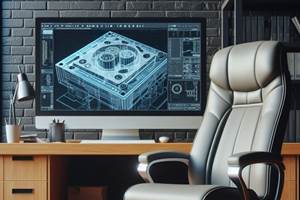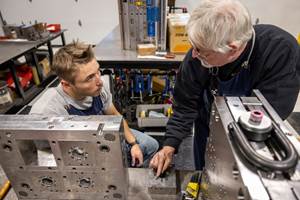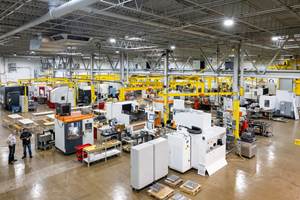Operator Training - Is Formal Training Really That Important?
Often, with a new machine acquisition, there are questions about the validity or necessity for formal, off-site, classroom operator training.
Often, with a new machine acquisition, there are questions about the validity or necessity for formal, off-site, classroom operator training. One moldmaker who has sat on both sides of the desk as trainee and trainer offers his perspective on one of the most important parts of any machine tool investment - operator training.
The single-best way to insure the successful integration of any new machine tool or new machine technology into a manufacturing facility is through training. Training means everything involved for the investor to quickly integrate the new capital acquisition into mainstream operation. This can only be done by complete and thorough training in the setup, programming, operation and maintenance of any given machine tool. This fact runs true through every type of machine tool. And while this was written with EDM training in mind, this piece can apply to any machine tool installation.
What Kind of Training Is It?
Operator training is typically standard with any new EDM purchase. This training should include: basic application recognition, machine-tool theory and operation, machine setup and programming procedures, tooling and setup strategies and preventive maintenance. For entry-level students, extra time spent on EDM theory and application recognition is advisable. All classroom and textbook activities should be generously interspersed with equal amounts of hands-on, practical application.
During operator training, special emphasis should be placed on tooling solutions and automated operations such as automatic tool changers and auto-threaders. This will help insure that the machine can run unattended for long periods of time. Automated and unattended operation has always been one of wire and CNC EDM's greatest strengths and is presently experiencing accelerated growth in the areas of automated part and electrode handling, palletization and robotics. Make certain that you learn how to fully exploit all of these productivity features.
How Many to Train?
EDM machines can amount to a considerable capital expense. Therefore, common sense dictates that you cannot afford to be only "one or two people deep" in this department. You should train as many people as the purchase agreement will reasonably allow. If only two students are included in the purchase price, negotiate or pay for an additional two if you can. If you cannot afford to have all four people out of the shop at the same time, request a "staggered" training program. Having a minimum of two professionally trained operators at all times will reduce the potential of illness or turnover from seriously impacting your EDM operations.
Another advantage of training multiple students is that the later comparison of different versions of classroom notes will help reinforce the strong, duplicate areas and fill in some of the finer points. These notes should be copied, compiled and added to the shop's reference library.
Who Should Go?
Safeguard your capital investment by carefully selecting those who will be trained. It doesn't matter whether you choose your foreman or apprentice, as long as they have the aptitude, ability and willingness to accept this new challenge. These should be the sharpest and most ambitious of your toolroom personnel with a strong work ethic and who have shown a desire to learn. Journeyman experience is always a plus, but is not absolutely necessary, with third- or fourth-year apprentices proving to be excellent candidates. Regardless of their position or title, secure your investment by selecting your best people for training.
Your choice of students should obviously be the ones who are company-oriented - the ones who are happy and likely to remain in your employ for many years. Selecting career candidates for EDM training and cultivating them are the surest way to protect your long-term investment in this machine.
Note that there will be time and money invested in increasing your employees' knowledge and experience. You can't repossess this knowledge or experience should someone choose to leave with it. In other words, don't train people for your competition. Insure against this possibility by cultivating and grooming your best people and your investment will be even more secure.
Who Will Run My Shop?
Companies with newly purchased equipment often make the common mistake of not sending their best people for training because they believe that critical shop operations might suffer while they are away. This is understandable and probably accurate, but nevertheless, it is an illogical compromise for not sending your best. This error in thinking is facilitated by the rationalization of, "Since we can't afford for our Grade-A guy to be away, we can let the Grade-B guy go to training while the Grade-A guy stays here and works. When the Grade-B guy gets back, he can then train the Grade-A guy."
Before choosing this scenario, consider the following points:
1. Is either one of them qualified as a professional instructor on any machine?
2. Will they be equipped with the books, tools and study guides of the professional instructor? Not to mention the experience - remember that both A and B are presently EDM trainees.
3. Will there be time for B to train A, or will A continue to be too busy for sit-down training?
Finally, one must re-listen to the old saw: "The best student, trained by the best instructor and taking the best of notes will have less than 70 percent retention the following Monday."
This being said; unless you know your people are the best students, unless you know they are trained by the best instructors and unless you know they take the best of notes, then you already know that the best you can realize is something less than 70 percent efficiency!
This strategy is a false economy. The future of your EDM investment can suffer, perhaps indefinitely, simply because no one could possibly know the difference. They would have to be trained to know that.
We'll Fall Behind Schedule!
Except in the smallest of shops, the week spent in initial operator training should not be allowed to affect your business that much. Plan ahead by making the necessary schedule allowances before your EDM purchase. You should have plenty of time to adjust your work and delivery schedules because it can typically take several weeks for final selection, financing and delivery. This should be ample time to plan around this all-important part of your investment - operator training. Make this small sacrifice in scheduling and obtain as much training as you possibly can. Remember the main reason you have purchased this equipment - increased capacity and productivity. The increased productivity gained by a properly trained operator should quickly make up "lost" time and improve your delivery schedule.
The training itself can be conducted on- or off-site, depending upon the terms of your purchase agreement. Controlled, formal classroom training almost always proves the best, but if training is to be conducted on-site at your facility, be fair to both the instructor and the students by providing a quiet learning environment and uninterrupted training periods. Keep all interruptions to the students' (and instructor's) educational thought processes to an absolute minimum.
Training Equals Success
Training for EDM - or any other machine tool discipline - is integral to the success or failure of that investment and others related to it. The better prepared you are, the quicker this new addition will become a thriving asset and profit-center. The degree of success in operation is a direct reflection on the degree of success in training.
Operator training should never be considered complete. To help continue training, utilize books, trade journals and magazines, as well as conferences and seminars.
There's a lot more involved with obtaining and training skilled workers, such as the importance of supporting apprenticeship programs, vocational schools and community colleges, scholarships and OEM participation. In order to achieve continued success, moldmakers need to be passionate about the importance of training.
Related Content
Tackling a Mold Designer Shortage
Survey findings reveal a shortage of skilled mold designers and engineers in the moldmaking community, calling for intervention through educational programs and exploration of training alternatives while seeking input from those who have addressed the issue successfully.
Read MoreEden Tool and Eden Manufacturing: A Story of Resilience, Growth and Innovation
This critical parts manufacturer, founded on solid tooling fundamentals, didn’t get derailed with the unexpected passing of the owner because leadership was already building a solid business, not just a good tool shop. Here’s how they managed change incrementally… and they’re not finished yet.
Read MoreHow to Improve Your Current Efficiency Rate
An alternative approach to taking on more EDM-intensive work when technology and personnel investment is not an option.
Read MoreCross Training, In-House Capabilities and Collaborative Design Move Helm Tool Forward
Cross-training, bringing it all in-house, molding and collaborative design are essential to Helm Tool's success.
Read MoreRead Next
Reasons to Use Fiber Lasers for Mold Cleaning
Fiber lasers offer a simplicity, speed, control and portability, minimizing mold cleaning risks.
Read MoreHow to Use Strategic Planning Tools, Data to Manage the Human Side of Business
Q&A with Marion Wells, MMT EAB member and founder of Human Asset Management.
Read MoreHow to Use Continuing Education to Remain Competitive in Moldmaking
Continued training helps moldmakers make tooling decisions and properly use the latest cutting tool to efficiently machine high-quality molds.
Read More





















